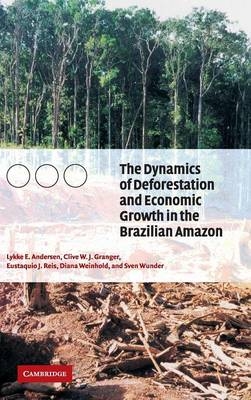
The Dynamics of Deforestation and Economic Growth in the Brazilian Amazon
Cambridge University Press (Verlag)
978-0-521-81197-2 (ISBN)
A multi-disciplinary team of authors analyze the economics of Brazilian deforestation using a large data set of ecological and economic variables. They survey the most up to date work in this field and present their own dynamic and spatial econometric analysis based on municipality level panel data spanning the entire Brazilian Amazon from 1970 to 1996. By observing the dynamics of land use change over such a long period the team is able to provide quantitative estimates of the long-run economic costs and benefits of both land clearing and government policies such as road building. The authors find that some government policies, such as road paving in already highly settled areas, are beneficial both for economic development and for the preservation of forest, while other policies, such as the construction of unpaved roads through virgin areas, stimulate wasteful land uses to the detriment of both economic growth and forest cover.
Chief Economist, Sustainable Development Department, Institute for Socio-Economic Research, Catholic University of Bolivia, La Paz. Chancellor's Associate Chair in Economics, University of California, San Diego. Winner of The Nobel Prize for Economics 2003. Director of Macroeconomic Studies, Institute for Applied Economic Research (IPEA), Rio de Janeiro. Reader in Economics, London School of Economics and Political Science. Centre for Development Research, Copenhagen.
Preface; Part I. Overview of Issues: 1. The Brazilian Amazon; 2. Extent of deforestation; 3. Review of sources on deforestation; Part II. Econometric Analysis of the Causes of Deforestation: 4. The DESMAT data set; 5. An econometric model of deforestation; 6. Further analysis - cattle ranching; 7. Urban infrastructure; 8. Carbon emissions from Amazon deforestation; Part III. Economics of Deforestation: 9. Economic analysis of deforestation; Part IV. Alternatives to Deforestation: Extractivism - an Economically Viable Alternative to Deforestation?: 10. Plant extractivism in Brazil; 11. Plant extraction in the Amazon - a spatial analysis; Part V. Policy Implications, Discussion and Conclusion: 12. Policy implications and recommendations; 13. Conclusion; Appendix. Econometric methods.
| Erscheint lt. Verlag | 12.12.2002 |
|---|---|
| Zusatzinfo | 60 Tables, unspecified; 1 Maps; 2 Halftones, unspecified |
| Verlagsort | Cambridge |
| Sprache | englisch |
| Maße | 152 x 229 mm |
| Gewicht | 550 g |
| Themenwelt | Naturwissenschaften ► Biologie ► Ökologie / Naturschutz |
| Naturwissenschaften ► Geowissenschaften ► Geografie / Kartografie | |
| Wirtschaft ► Volkswirtschaftslehre ► Ökonometrie | |
| ISBN-10 | 0-521-81197-X / 052181197X |
| ISBN-13 | 978-0-521-81197-2 / 9780521811972 |
| Zustand | Neuware |
| Informationen gemäß Produktsicherheitsverordnung (GPSR) | |
| Haben Sie eine Frage zum Produkt? |
aus dem Bereich


